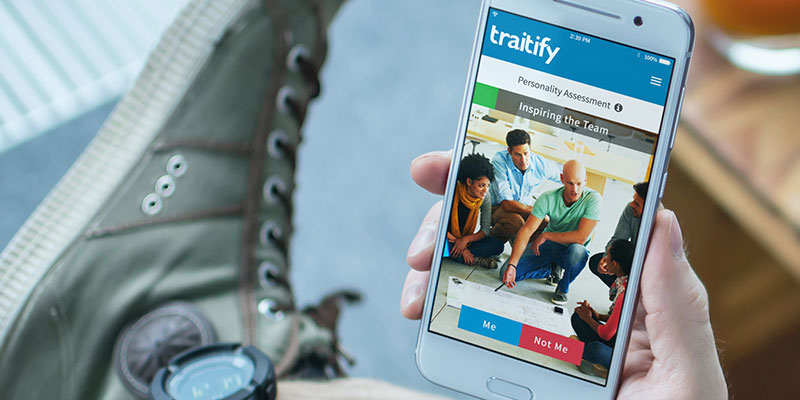Personality tests are big business. Estimates value the industry at between US$2bn and US$4bn. Carl Jung – analytical psychology’s founding father – would have been impressed.
In the US alone, there are approximately 2,500 different personality tests available. The most famous is the Myers Briggs Type Indicator, developed in the 1960s. You may have taken it yourself.
Why do companies love personality tests?
Adam Grant is a renowned psychologist with an interest in how people interact in the workplace: “To work well with other people, you need to understand their personalities and they need to understand yours.” This is exactly why we turn to personality tests. “There are two main reasons [why] organizations use psychometrics,” says Saberr CEO Tom Marsden. “To hire better and to increase trust and understanding between existing employees.” Whether it’s for recruitment or team development, you need to know which tests are best suited to your workplace. And do they really do what they claim?
Assessing the assessments
To help, we’ve attempted to summarize a selection of the major tests available today. We start with the most well-known, the Myers-Briggs Type Indicator.

Myers-Briggs Type Indicator
Four primary metrics, including the classic ‘introvert/extrovert’ dichotomy, result in the respondent being given one of 16 four letter classifications.
Its biggest problems, so say psychologists, is that Myers-Briggs Type Indicator’s underlying assumptions aren’t based on anything more than Carl Jung’s own 'armchair philosophy' (according to Adam Grant). MBTI has also been criticized for its poor test-retest validity – someone taking the test on two different days could get two different results (although not wildly different). If anecdotal evidence is anything to go by, MBTI helps individuals learn something about themselves and about others, but mostly without ever putting this knowledge to practical use1.
Best for?
Building and developing existing teams.

Deloitte Business Chemistry
Deloitte has come up with its own personality test. But why did they do it? “We find people often can’t remember what they learned,” says Deloitte’s applied insights lead, Dr. Suzanne Vickberg. "They have little idea how to use the information to inform their interactions with others.” So Deloitte created its own, called Deloitte Business Chemistry. It categorizes subjects into four groups: Guardians, Pioneers, Drivers or Integrators2.
How does the system work in real life? Deloitte’s Suzanne Vickberg gives some examples: “Will the team expect people to make decisions on the spur-of-the-moment? If so, Guardians may feel they don’t have time to conduct the proper due diligence they need to make a sound decision. Or, does the team tend to stick with the status quo? If so, both Drivers and Pioneers may get impatient and frustrated, feeling that innovation is squashed by this bias.”
Best for?
Building and developing existing teams. Can be used for hiring.

Traitify
Based on the popular Five Factor Model, Traitify adds a quick and easy image-based interface. “Images are processed much faster in the brain than words,” says Traitify’s Chief Psychology Officer, Heather Myers. “The overall effect is a questionnaire that takes a fraction of the time – compared to more traditional formats – to complete. The sub 2-minute format is ideal for prioritizing applicants in high-volume hiring environments where recruiters can't possibly review everyone. Also, it's great for those who have difficulty reading (those who are visually impaired, for instance) or for whom English is not their first language.” Traitify is API-centric so it fits neatly within Applicant Tracking Systems or other HRIS and is also designed mobile-first, working equally well across all device platforms3.
Best for?
Predicting performance and reducing turnover for hiring, also building and developing existing teams.

MBTI or Five Factor?
The scientific community doesn’t think much of MBTI. Right now, an approach known as ‘The Five Factor Model’ is considered more robust, originating from research instead of Carl Jung’s own hypotheses and observations. The Five Factor Model’s scientific grounding dates back to a 19th -century study of 4,500 English words relating to human personality traits. These were ultimately grouped into five categories. Subsequent studies in other languages have found similarly consistent results.

Gallup Strengthsfinder
Yep, the same Gallup that creates the surveys also has its own personality test, called CliftonStrengths. Based on original research of psychologist Donald O. Clifton, Gallup’s offering is an hour-long online assessment that asks the user to choose between 177 paired statements. It then creates an in-depth report that groups 34 traits into four categories: strategic thinking, influencing, executing, and relationship building4.
Does it work?
CliftonStrengths’ difference is that it focuses solely on a person’s strengths. Got the right qualities to be a good manager? Or a great team player? Gallup’s test will give you a steer.
Best for?
Building and developing existing teams. Can be used for hiring.

Hogan
Hogan’s suite of personality tests, based on proprietary research, are used by some of the world’s biggest companies, from McDonald’s to HSBC. It’s based on the Five Factor Model, so comes with a solid research background. Hogan’s tests believe human interactions are the driving force in life. “We are only alive when we’re doing social interaction,” says Dr. Robert Hogan, the company’s founder. “The rest of our life concerns getting ready for interaction or reviewing the consequences of the last interaction. Interaction is where the action is.” Hogan’s test, like its founder, doesn’t pull any punches. It has been known to deliver some hard-to-swallow results.
Best for?
Hiring new recruits and building and developing existing teams.

Caliper Profile
Based on the ideas of psychologist Dr. Herbert Greenberg, Caliper has been in use for over 50 years, having been created in 1961 and updated regularly since then. The Caliper Profile is well-regarded as a hiring and personal development tool that can help you find the right people and “increase productivity, employee engagement, and profitability.” It considers both strengths and weaknesses, and is designed specifically for the workplace. However, it’s questions are often transparent – the ‘right’ answer can appear too obvious.
Best for?
Primarily hiring, but also team development.

Saberr
Based on the Five Factor Model, Saberr, like Traitify, feels slicker and glossier than its stuffier predecessors. Saberr can be used for both hiring and team development, but Saberr goes further than some other tests by assessing both personality and values – a person’s deeply held beliefs. Assessing values means a better chance of improved cultural fit. Saberr’s CEO, Tom Marsden: “One organization using Saberr Base found a sales team with high values alignment generated 1.9x the revenue of other less-aligned teams in the organization.”
Best for?
Both hiring and team development.

SHL
SHL is aimed squarely at the hiring process. It measures over 30 relevant traits to determine someone's behavioral style in the workplace. Karen Falconer, HR Knowledge Manager at UK-based consultancy HR Solutions: “There are no right or wrong answers and it is untimed, which gives people the ability to self-reflect where they need to. It provides a straightforward indicator of strengths, which can then be matched to the desired strengths or requirements of a particular role.”
Best for?
Hiring only.

Belbin
Based on the theories of Meredith Belbin, a management professor from the UK, the Belbin Team Role Self‐Perception Inventory (BTRSPI) identifies nine categories of an individual’s personality. The Belbin assessment believes a team will be far more successful if it has at least one person from each of the three categories, ideally from all nine. Karen Falconer, HR Knowledge Manager from HR Solutions: “Belbin is good for individuals and great for teams. It identifies other role types which individuals should work alongside. It also advises how individuals may best be managed and the type of working environment someone is best suited to.”
Best for?
Team development and hiring.
Build the best possible teams
Even the very best teams suffer from a phenomenon known as 'groupthink'. Find out how to avoid it. Read the article.







